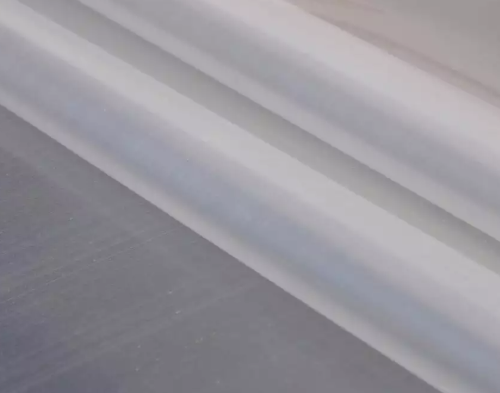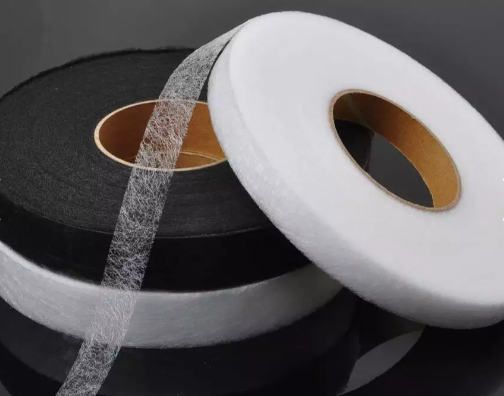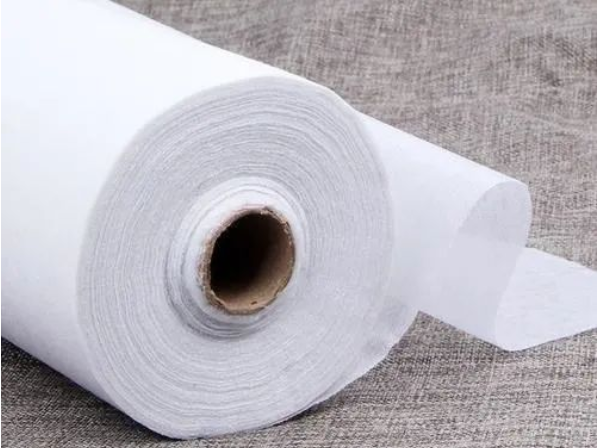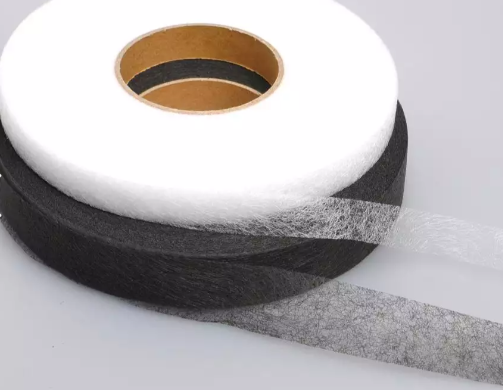The application of web interlining in clothing is impossible without it!
2023-01-11.
Clothes are sewn and assembled by hand according to the pattern. With the development of bonding technology, web interlining is gradually produced and used. Bonding takes the place of traditional stitching. The clothing technology has brought about new changes. The interlining of clothing plays a role in reinforcing and shaping clothing, and is an indispensable auxiliary material for clothing production.
"The development process of interlining has experienced the transition from cotton, linen, brown, fabric lining and starch cloth lining, resin lining to web interlining, which is the web interlining used in most clothing production in the global market."

Web interlining is a new material gradually applied in the middle of the 20th century. The UK first scattered PE powder on the lining, heated and heat set, and then made hot melt adhesive lining, which was pressed with hot air, and then used PVC, ethylene-vinyl acetate copolymer, polyamide and other new materials to make hot melt lining.
In the 1970s, web interlinings were widely used in Germany, Japan, the United States and other countries, and entered a stage of rapid development, bringing epoch-making changes in garment processing technology. Taking Japan as an example, there were 5000 tons of hot-melt adhesive applied to garment web interlinings in 1981.
Today, the United States uses more than 40% of the total number of clothing with web interlinings, while Japan uses about half of men's clothing and 90% of women's clothing with web interlinings. The world needs about 40000 tons of hot melt adhesive to produce web interlinings for clothing every year, and the web interlinings for clothing are more than 1.2 billion meters. The growth rate of hot melt adhesive used for web interlinings for clothing has greatly exceeded the growth rate of the clothing industry itself, In the past 20 years, the usage has increased 10 times, and the use of clothing web interlining and hot melt adhesive has become a symbol of the modernization of clothing manufacturing technology.

Web interlining is an interlining that is uniformly bonded with the hot-melt adhesive on the base cloth (non-woven fabric or cotton fabric). After being pressed and bonded in the fabric of the collar, flap, front and back of the garment, the garment becomes curved, straight, wrinkle-free, shapeless, elastic, durable, beautiful, light and comfortable. It can also reduce the cost, improve the grade, simplify the process, and improve the production efficiency, which has high value.
"It has been widely used in the sleeve, collar, hem, hem, chest, placket, body, waist, foot opening, pocket opening and other places of clothing, and even used for the bonding of climbing, patch bag and other places. The adhesive materials include canvas, flannel, polyester, polyester card, polyester cotton, corduroy, woolen tweed, woolen tweed, etc."

In addition to clothing, adhesive lining is also used in shoes and hats, leather, decoration and other departments. In the leather industry, the bottom plate of fur or leather is bonded with the lining cloth by using the adhesive lining cloth, and then cut into pieces to improve the shape retention performance. The adhesive interlining is used in leather decorative products and leather bag and handbag industry to stiffen and fill.
In the shoe and hat industry, the low-cost adhesive interlining with non-woven fabric as the base cloth is used for the middle lining, upper, brim, heel lining and other parts. When in use, the lining cloth is bonded with the cap material and shoe material, and then cut. The lining will stiffen.

The web interlining is also used in the decoration industry, for example:
① Embroider the colored polyamide hot-melt adhesive (PA) silk thread on the bottom cloth of the woven viscose fabric, and then press the embroidery on the appropriate part of the garment. The viscose backing cloth is brittle and falls off when heated, and the colorful hot-melt adhesive silk thread forms a beautiful pattern on the clothing.
② Trademarks, lace, labels, etc. are coated with hot melt adhesive, which can be directly ironed on various textile products;
③ With special hot melt adhesive, metal sheets, glass beads, diamonds, etc. are arranged according to certain patterns, and are permanently fixed on the fabric to form sparkling special decorations.
Although the web interlining is used as clothing lining, its quality requirements are stricter than the fabric in some aspects. The reason is simple, because the quality of a small piece of interlining can affect the use value of a garment. As a textile, the web interlining should not only be inspected for general appearance quality, but also focus on the requirements for its internal quality and wearability to ensure the use value of the finished clothing.